Davenport, Iowa
| Davenport | |||
|---|---|---|---|
| — City — | |||
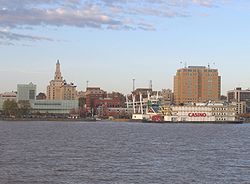 |
|||
|
|||
| Motto: Working together to serve you | |||
 |
|||
| Coordinates: | |||
| Country | |||
| State | |||
| County | Scott | ||
| Settled | May 14, 1836 | ||
| Incorporated | January 25, 1839 | ||
| Government | |||
| - Type | Mayor–council | ||
| - Mayor | Bill Gluba (NP/D)[1] | ||
| Area | |||
| - City | 64.9 sq mi (168.1 km2) | ||
| - Land | 62.8 sq mi (162.7 km2) | ||
| - Water | 2.2 sq mi (5.7 km2) | ||
| Elevation | 580 ft (177 m) | ||
| Population (2009 est.) | |||
| - City | 101,360 | ||
| - Density | 1,566.5/sq mi (604.8/km2) | ||
| - Metro | 379,066 (132nd) | ||
| Time zone | CST (UTC-6) | ||
| - Summer (DST) | CDT (UTC-5) | ||
| ZIP codes | 52801-52809 | ||
| Area code(s) | 563 | ||
| FIPS code | 19-19000 | ||
| GNIS feature ID | 0455799 | ||
| Website | www.cityofdavenportiowa.com | ||
Davenport is a city located along the Mississippi River in Scott County, Iowa, United States. Davenport is the county seat of and largest city in Scott County. As of the 2000 census, the city had a population of 98,359. A 2009 estimate shows the population has increased slightly to 101,360, making it Iowa's third-largest city. Davenport is one of the Quad Cities, along with neighboring Bettendorf and the Illinois cities of Moline, East Moline, and Rock Island. The Quad Cities has a population of 379,066. Davenport was founded on May 14, 1836, and was named after Colonel George Davenport, a friend of founder Antoine LeClaire. As of 2010, the mayor is Bill Gluba.
Located approximately half way between Chicago and Des Moines, Davenport sits on the Mississippi River on the border of Iowa and Illinois. The city is prone to frequent flooding due to its location on the Mississippi River. There are two main universities: Saint Ambrose University and Palmer College of Chiropractic, which is the birthplace of chiropractic and wellness techniques. Several well-known annual music festivals take place in Davenport, including the Mississippi Valley Blues Festival, The Mississippi Valley Fair, and the Bix Beiderbecke Memorial Jazz Festival, which is dedicated to native Bix Beiderbecke. An internationally known 7-mile (11 km) foot race called the Bix 7 is run during the festival. The city has a Class A minor league baseball team, the Quad Cities River Bandits. Davenport has twenty-seven parks and over 12 miles (19 km) of recreational paths for biking or walking.
Four interstates and two major United States Highways serve the city. Davenport has seen steady population growth since its incorporation, with an exception being the 1980s, when the population decreased due to job loss. Davenport has a declining crime rate and a low rate of unemployment, and was ranked as the most affordable metropolitan area in 2010 by Forbes. In 2007, Davenport, along with neighboring Rock Island, won the City Livability Award. Notable natives include jazz musician Bix Beiderbecke and NFL running back Roger Craig.
Contents |
History
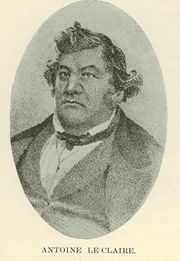
In 1832, Sauk Indian tribe chief Keokuk and United States Army General Winfield Scott signed a treaty to end the Black Hawk War.[2] Antoine LeClaire, who was part French and part Pottawattamie, served as translator. Chief Keokuk gave a generous portion of the land to Antoine's wife, Marguerite LeClaire, who was the granddaughter of a Sac chief.[2] Keokuk stipulated that Antoine build their home on the exact spot where the treaty was signed or forfeit the land. Antoine did so, finishing the Treaty House in the spring of 1833. Davenport was established on May 14, 1836 by Antoine LeClaire, and named after his good friend Colonel George Davenport and incorporated on January 25, 1839.[2]
Davenport became the county seat after four years of effort. In 1837, shortly after Scott County was formed, Davenport and rival neighbor Rockingham both campaigned to become the county seat. The city with the most votes in the February 1838 election would become the county seat.[3] On the eve of the election, Davenporters secured the temporary service of Dubuque laborers so that they could vote in the election and Davenport won. Rockingham supporters did not like this and protested the elections to the territorial governor, who refused to certify the results of the election. A second election was scheduled for the following August. To avoid another import of voters, the governor set a 60-day residency requirement for all voters. Davenport was again the victor by only two votes.[3] A third election was set by the Territorial Legislature for the summer of 1840. As the August election drew nearer, Rockinghamers grew tired of the county seat cause, and the efforts of other Davenporters were difficult to challenge. Davenport easily won the third election. To ensure that the county seat issue would not be played out again, Davenport built the first county courthouse.[3]
In 1856, Rock Island Railroad built the first railroad bridge across the Mississippi River, connecting Davenport and Rock Island, Illinois.[4] Steamboat companies saw nationwide railroads as a threat to their business and on May 6, 1856, just weeks after it was completed, a steamboat captain deliberately crashed the Effie Afton into the bridge. The owner of the Effie Afton, John Hurd, filed a lawsuit against The Rock Island Railroad Company, who Abraham Lincoln defended as trial lawyer.[4] The United States Supreme Court decided the bridge could remain.[5]

Just before the start of the Civil War, Governor Samuel J. Kirkwood declared Davenport to be Iowa's first military headquarters and five camps were set up in the city to aid the Union.[6] After the Civil War, hundreds of Iowa children were left homeless. On November 16, 1865, the "Iowa Soldier's Orphans' Home" (renamed the Annie Wittenmyer Home in 1949) was opened.[7] Starting in 1876, children from broken homes as well as orphans from all of Iowa's ninety-nine counties would live in the home. The home was a self-contained community containing residences, a school, tailor shop, and a chapel.[7] After 110 years of service the home closed in 1975.
The Davenport City Hall was built in 1895, for the meager price of $100,000 ($2.63 million in 2011 dollars).[8][9] Architectural journals poked fun at city leaders due to the small amount budgeted for the project. The 1920s brought an economic and building boom. The city's skyline began to form with the construction of commercial buildings like the Kahl Building, the Parker Building, and the Capitol Theatre. Large national department stores also arrived downtown, including Montgomery Ward, Sears, and J.C. Penney.[10]
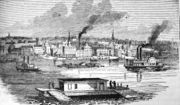
By 1932 thousands of Davenporters were on public relief due to the Great Depression. A shantytown grew in the west end of the city along the Mississippi River. Sickness, hunger, and unsanitary living conditions plagued the area. That would soon end, as many citizens went to work for the Works Progress Administration and then Davenport experienced a boom after World War II.[10] Oscar Mayer, Ralston Purina, and other companies built plants in west Davenport. The Interstate highway network was brought to Davenport in 1956. By 1959 more than 1,000 homes a year were being constructed.[10] By the late 1970s the good times were over for both downtown and local businesses and industries. The farm crisis of the 1980s hit Davenport and the rest of the Quad Cities hard; 35,000 workers lost their jobs through the entire Quad Cities area.[10] The Caterpillar plant on the city's north side closed, causing many jobs to be lost. The 1990s brought the beginnings of a turnaround for the city.[10] In recent years, many renovations and building additions have occurred to revitalize the downtown area, including fixing up Modern Woodmen Park and building the Skybridge and the Figge Art Museum.
Geography
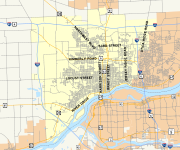
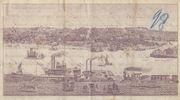
Davenport is located at (41.542982, −90.590745).[11] According to the United States Census Bureau, the city has a total area of 64.9 square miles (168 km2), of which, 62.8 square miles (163 km2) is land and 2.2 square miles (5.7 km2) (3.31%) is water.[12]
Davenport is located approximately 170 miles (270 km) west of Chicago and 170 miles (270 km) east of the Iowa state capital of Des Moines. The city is located about 200 miles (320 km) north of St. Louis, Missouri, and 265 miles (426 km) southeast of Minneapolis, Minnesota. Farmland surrounds Davenport, outside the Quad Cities area. The Mississippi River in Davenport has a maximum depth of around 30 to 40 feet (9.1 to 12 m) and is 2,217 feet (676 m) wide where the Centennial Bridge crosses it.
Davenport is located on the banks of the Mississippi River. The river flows from east to west along Davenport's banks, as opposed to its usual north to south direction.[13] From the river the city starts to slope north up a hill, which is steep at some points. The streets of the city, especially downtown and in the central part of the town, follow a grid design. Davenport often makes national headlines when the Mississippi River floods.[14] It is the largest city bordering the Mississippi that has no permanent floodwall or levee.[15] Davenport prefers the open access to the river for parks and vistas over having access cut off by dikes and levees. Davenport has adopted ordinances that any new construction in the floodplain must be elevated above the 100-year-flood level or protected with walls. As a result, former mayor Phil Yerington publicly expressed the view that if they "let Mother Nature take her course, we'll all be better off".[14] An example of a building that is elevated or flood-proofed in Davenport is the Figge Art Museum.[16]
Climate

Davenport is in the humid continental climate (Dfa) on the Köppen climate classification. Summers are very warm to hot with high levels of humidity. Winters have cold temperatures and often high winds, with snow likely from November through February. Average snowfall in Davenport is 30.7 inches (780 mm) per year.[17] January is on average the coldest month, while July is the warmest.[18] The highest temperature recorded in Davenport was 103 °F (39 °C) on July 18, 2006.[19] The lowest record temperature, −22 °F (−30 °C), was recorded on February 2 and February 3, 1996.[20] Substantial weather changes frequently occur at three to four day intervals as a result of mid-latitude storm tracks.[21]
While situated squarely in the path of Tornado Alley and the potential certainly exists for one, no devastating tornado has ever touched down in Davenport.[22] The reason for a lack of tornadoes may be due to the fact that the Mississippi River and Rock River merge together close to the city.[22] Flooding, however, is often a problem in Davenport due to the lack of a flood wall. During the Great Flood of 1993, the water crested at 22.63 feet (6.90 m) on July 9.[23] This is nearly 8 feet (2.4 m) above the 14.9-foot (4.5 m) flood stage. Major flooding in Davenport causes many problems. Roads in and around the downtown area, including U.S. Route 67, are closed and cause increased traffic on other city roads. The effects of major flooding can be long-lasting. For example, during the 2008 flooding, Credit Island in the city's southwest corner remained closed for 5½ months while crews worked on cleaning up damage and removing river debris.[24] It is not just the Mississippi River that floods; Duck Creek, a stream situated in Bettendorf and Davenport, is vulnerable to flash flooding. Severe thunderstorms on Saturday, June 16, 1990, created heavy flash flooding in Bettendorf and Davenport that killed four people.[25] Another major flood happened on Thursday, June 12, 2008, when severe thunderstorms caused Duck Creek to jump its banks and flood into properties and nearby streets (see Iowa flood of 2008).[26]
| Climate data for Davenport, Iowa | |||||||||||||
|---|---|---|---|---|---|---|---|---|---|---|---|---|---|
| Month | Jan | Feb | Mar | Apr | May | Jun | Jul | Aug | Sep | Oct | Nov | Dec | Year |
| Record high °F (°C) | 69 (20.6) |
70 (21.1) |
88 (31.1) |
93 (33.9) |
94 (34.4) |
100 (37.8) |
103 (39.4) |
100 (37.8) |
98 (36.7) |
95 (35) |
80 (26.7) |
72 (22.2) |
103 (39.4) |
| Average high °F (°C) | 30 (-1.1) |
36 (2.2) |
48 (8.9) |
61 (16.1) |
72 (22.2) |
81 (27.2) |
85 (29.4) |
83 (28.3) |
76 (24.4) |
65 (18.3) |
48 (8.9) |
35 (1.7) |
60.0 (15.56) |
| Average low °F (°C) | 13 (-10.6) |
19 (-7.2) |
29 (-1.7) |
41 (5) |
52 (11.1) |
63 (17.2) |
68 (20) |
66 (18.9) |
57 (13.9) |
45 (7.2) |
32 (0) |
20 (-6.7) |
42.9 (6.06) |
| Record low °F (°C) | -17 (-27.2) |
-22 (-30) |
-3 (-19.4) |
19 (-7.2) |
32 (0) |
44 (6.7) |
53 (11.7) |
44 (6.7) |
35 (1.7) |
22 (-5.6) |
8 (-13.3) |
-18 (-27.8) |
-22 (-30) |
| Precipitation inches (mm) | 1.28 (32.5) |
1.41 (35.8) |
2.59 (65.8) |
3.64 (92.5) |
4.44 (112.8) |
4.75 (120.7) |
2.99 (75.9) |
4.31 (109.5) |
2.90 (73.7) |
2.39 (60.7) |
2.47 (62.7) |
1.93 (49) |
35.10 (891.5) |
| Source: The Weather Channel[18] | |||||||||||||
Neighborhoods

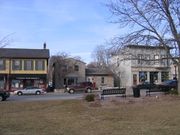
Davenport has a variety of neighborhoods dating back to the 1840s.[27] The original city plot was around current day Ripley and 5th Streets, where Antoine LeClaire had built his house. The city can be divided into five areas: downtown, central, east end, near north and northwest, and west end. Many architectural designs are found throughout the city including Victorian, Queen Anne, Tudor Revival, and others.[28] Many of the original neighborhoods were inhabited by German settlers.[27]
The east side of the city dates back to 1850 and has always contained higher end housing. The proximity and commanding view of the river kept these neighborhoods a fashionable address long after the original families departed.[29] Lindsay Park, in The Village of East Davenport, was used as parade grounds for Civil War soldiers from Camp McClellan.
In contrast to the east side, the central and west neighborhoods originally contained many of the working class Germans who settled the town. Development on the west side started in the 1850s with extensive construction occurring in the 1870s.[30] Housing was mostly one and a half to two story front gable American Foursquare and simplified Queen Anne style. The central Hamburg neighborhood contains the most architecturally significant residences in the old German neighborhoods.[31] Also in central Davenport, the Vander Veer Park Historic District is a neighborhood anchored by Vander Veer Park, a large park with a botanical garden and a fountain. The park was modeled after New York City's Central Park and originally shared its name.[32] Vander Veer is surrounded by large Queen Anne and Tudor Revival style houses that were built between 1895 and 1915. Development of the Vander Veer Park was the first major beautification effort outside two small spaces in downtown.[32]
Today the eastern side of Davenport still contains many of the higher class houses in the city. The old Civil War parade grounds, in The Village of East Davenport ("The Village" for short), have been turned into Lyndsey Park, which is surrounded by small specialty shops. West of The Village, downtown contains the two tallest buildings in the Quad Cities, The Wells Fargo bank building which is seventeen stories tall and the MidAmerican building is fifteen.[33] Downtown contains a few other tall buildings, including the eleven-story Black Hawk Hotel and the ten-story Kahl Building.[33]
Demographics
| Historical populations | |||
|---|---|---|---|
| Census | Pop. | %± | |
| 1850 | 1,848 |
|
|
| 1860 | 11,267 | 509.7% | |
| 1870 | 20,038 | 77.8% | |
| 1880 | 21,831 | 8.9% | |
| 1890 | 26,972 | 23.5% | |
| 1900 | 35,254 | 30.7% | |
| 1910 | 43,028 | 22.1% | |
| 1920 | 56,727 | 31.8% | |
| 1930 | 60,751 | 7.1% | |
| 1940 | 66,039 | 8.7% | |
| 1950 | 74,549 | 12.9% | |
| 1960 | 88,981 | 19.4% | |
| 1970 | 98,469 | 10.7% | |
| 1980 | 103,264 | 4.9% | |
| 1990 | 95,333 | −7.7% | |
| 2000 | 98,359 | 3.2% | |
| Est. 2009[34] | 101,360 | 3.1% | |
According to a 2009 estimate, the city population grew to 101,360 and the Quad Cities metropolitan area grew to 379,066.[34][35][36] As of the 2000 census, there were 98,359 people, 39,124 households, and 24,804 families residing in the city. The population density was 1,566.5 people per square mile (604.8/km²). There were 41,350 housing units at an average density of 658.5/sq mi (254.3/km²). Davenport's population density is thirty times the average density of Iowa and twenty times the average density of the United States.[37][38] However, it is about a third less than Des Moines and twenty percent less than Cedar Rapids, the only two cities in Iowa with higher populations than Davenport. Sioux City, the next city smaller than Davenport in population, has a density of 5 people more per square mile.[38][37]
The racial makeup of the city was 83.68% White, 9.24% Black or African American, 0.37% Native American, 2.00% Asian, 0.02% Pacific Islander, 2.32% from other races, and 2.36% from two or more races. 5.36% of the population was Hispanic or Latino of any race.[39] There were 39,124 households out of which 31.8% had children under the age of 18 living with them, 46.0% were married couples living together, 13.4% had a female householder with no husband present, and 36.6% were non-families. Of all households, 29.5% were made up of individuals and 9.4% had someone living alone who was 65 years of age or older. The average household size was 2.44 and the average family size was 3.03.[39]
The percent of all races, with the exception of white, are higher in Davenport, then Iowa averages, with the African American population in Davenport four times the average of Iowa.[40] Contrary to Iowa, only whites have a higher percent in Davenport, than in the United States as a whole.[41] In the city the population was spread out with 26.2% under the age of 18, 10.7% from 18 to 24, 30.1% from 25 to 44, 20.9% from 45 to 64, and 12.1% who were 65 years of age or older. The median age was 34 years. For every 100 females there were 94.7 males[39] All of which are within one percent of United States averages.[41]
Crime
Crime in Davenport is on the decline. Violent crimes, which include robbery, rape, and assault, have fallen 35.7% from 2002–2006.[42] Murders are down 42.9% from 2000 to four murders in 2006.[42] From 2005 to 2006, stolen vehicles decreased by 36.6% to 295, burglaries decreased 12.7% to 1,449, aggravated assaults decreased by 46.3% to 481, and robberies decreased by 10.5% to 271. Forcible sex abuse is the only crime with an increase, up 17.4% to 142 cases.[42]
Economy
Davenport's biggest labor industry is manufacturing, with over 7,600 jobs in the sector.[43] John Deere is the second largest employer in the Quad Cities, after the Rock Island Arsenal as a whole. Deere, however, is the largest single employer, employing 7,200 workers in the Quad Cities and has a plant on Davenport's north side.[44] Other large employers in Davenport and the Quad Cities are Genesis Health System with 5,125 employees, Trinity Regional Health System with 3,333, regional grocery store Hy-Vee with 3,138 and the Davenport Community School District with 2,237 employees.[44]
Davenport is the headquarters for department store Von Maur, which has twenty-two stores in nine states.[45][46] Davenport is also the headquarters of Lee Enterprises, which publishes fifty-five daily newspapers and more than 300 weekly newspapers, shoppers, and specialty publications, along with online sites in twenty-three states.[47] As of September 2009, the unemployment rate in Davenport and the rest of the Quad Cities, had risen to 8.4%.[48]
The median income for a household in the city is $40,378 with families earning $51,445.[49] Males had a median income of $41,853 versus $30,002 for females.[49] The per capita income for the city was $18,828. About 10.5% of families and 14.1% of the population were below the poverty line, including 19.2% of those under age 18 and 6.4% of those ages 65 or over.
Davenport has a lower cost of living than the national average, with the average home price being $99,312.[50] In 2010, Forbes ranked Davenport as the best metropolitan area for cost of living, up from second in 2009.[51][52] CNN Money ranked Davenport as the sixteenth most affordable housing in the country.[53]
The surrounding Quad Cities have a few major places of employment, including the Rock Island Arsenal, which is the largest government-owned weapons manufacturing arsenal in the United States.[54] KONE, Inc, a large manufacturer of elevators, is located in Moline, Illinois. Alcoa, a large aluminum manufacturer, is located in Riverdale, Iowa. Other local businesses include Whitey's Ice Cream, Hungry Hobo sandwich shop, and Happy Joe's and Harris Pizza – both local pizza restaurants.
Culture
Landmarks
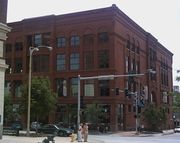
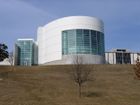
Downtown Davenport has many points of interest including the Davenport Public Library, the Davenport Skybridge, Figge Art Museum, River Music Experience, Putnam Museum and IMAX Theater, Modern Woodmen Park which is home of the Quad City River Bandits baseball team and the Centennial Bridge. Entertainment venues include the Chicago, Milwaukee, St. Paul and Pacific Freight House (The Freight House).
Davenport has a few cultural and educational institutions, including the Figge Art Museum, the Putnam Museum which was founded in 1867 and was one of the first museums west of the Mississippi River,[56] and the Quad City Symphony Orchestra, headquartered in downtown Davenport, was founded in 1915.[57] The Davenport Public Library was opened in 1839.
Uptown features the Great Mississippi Valley Fairgrounds, which hosts fairs, stock car racing, and many other events. NorthPark Mall is the city's main shopping mall and has 160 stores. Its companion, SouthPark Mall, is located in Moline. Brady Street Stadium is home to Davenport high school and Saint Ambrose University football games. Davenport has a number of parks, including Credit Island park which has a bike path, baseball diamonds, tennis courts, and fishing along the Mississippi River. Vander Veer Botanical Park has a small botanical garden and also features a walking path, a lagoon, and a large fountain.
Events and festivals
Bix Fest is a three-day music festival with many traditional jazz bands held in tribute to internationally renowned jazz cornetist, pianist, composer, and Davenport native Bix Beiderbecke. The festival was started in August 1971 and the Bix Beiderbecke Memorial Society was founded one year later to organize and sponsor it.[58] 2009 was the 39th consecutive festival. In addition to the Bix Fest, the Wells Fargo Street Fest features live music, food, and vendors.
The annual Bix 7 is a 7-mile (11 km) road race held in late July in Davenport. The race was founded in 1975 by a resident of Bettendorf, Iowa, who wanted to bring to the Quad Cities some of the excitement he felt when he ran his first Boston Marathon.[59] The first race had 84 participants, but today 12,000 to 18,000 runners take part.[59][60][61] In late July or early August the six-day Great Mississippi Valley Fair features major grandstand concerts, carnival rides, attractions, and food vendors.[62] Sturgis on the River is a large annual gathering of motorcycles which includes bands and food vendors.[63]
Sister cities
Davenport has three sister cities.[64] Kaiserslautern, Germany, became a sister city on June 10, 1960.[64] The coastal city of Ilhéus in Bahia, Brazil, became Davenport's sister city on January 31, 2005.[64] Finally, Davenport and County Carlow, Ireland, became sister cities on September 26, 2006.[64]
Sports and recreation

Davenport and the Quad Cities are home to many sports teams. The Quad Cities River Bandits baseball team play games at Downtown Davenport's Modern Woodmen Park. The i wireless Center in Moline is home to the Quad City Mallards hockey team. The Quad Cities Riverhawks are a Premier Basketball League team. They play their home games at Wharton Field House on the old Marycrest International University campus. Davenport high schools are in the Mississippi Athletic Conference for sports.
Davenport has twenty-seven parks with a total of 2,200 acres (8.9 km²) of land.[65] Major parks include Credit Island, which is a 420-acre (1.7 km2) park in southwest Davenport located alongside the Mississippi River.[66] Fejervary Park contains a pool and children's zoo and has had approximately 20,000 visitors each year since 1996.[66]
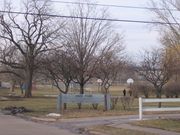
Junge Park is situated along the Duck Creek Parkway and includes baseball and softball fields, sand volleyball, and basketball courts.[66] LeClaire Park is located right on the banks of the Mississippi River next to Modern Woodmen Park. LeClaire Park hosts many summer events including River Roots Live and Ribfest.[67] Bands for the Bix Fest play in the park each July. Vander Veer Botanical Park welcomes approximately 25,000 visitors to continuous floral shows.
The city features two recreational trails for biking or walking. Duck Creek Parkway extends from Emeis Park in west Davenport 8.26 miles (13.29 km) east to Bettendorf along Duck Creek. Riverfront Parkway extends 4.75 miles (7.64 km) along the Mississippi waterfront from Credit Island to Bettendorf. Both these trails continue into Bettendorf.[66] Plans are being discussed to connect the two trails in Riverdale.[68] Four public golf courses are offered in the city, which are designed and maintained to satisfy all types of golfing interests.[69]
Davenport offers a few river-related activities. The Celebration Belle has river cruises from a one-and-a-half-hour sightseeing cruise[70] to an all-day three-meal cruise up to Dubuque, Iowa.[71] The Channel Cat boat offers rides across the river and has two stops in Iowa and three stops in Illinois and connects the bike paths that each state has on its river front.[72]
Media

The major daily newspaper in Davenport is the Quad-City Times. An alternative free newspaper, the River Cities Reader, is published in Davenport. All four major television networks have stations in the area, including KWQC (NBC) and KLJB (Fox) in Davenport. WHBF (CBS) is located in Rock Island and WQAD (ABC) is in Moline.
The Quad Cities ranks as the 97th largest market for television [73] and the 147th largest market for radio.[74] Radio station WOC made its local broadcasting debut on February 18, 1922. It was the second licensed station on the air.[75] In 1933 WOC hired future president Ronald Reagan as a staff announcer.[75]
Government
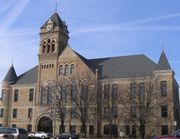
Davenport uses a mayor-council form of local government, which consists of a mayor (currently in 2010 Bill Gluba) and a ten-person council. One person is elected from each of the eight wards and two at-large aldermen are elected to represent the whole city. Nonpartisan elections are held in odd-numbered years. The mayor is the city's chief executive officer. He or she approves, vetoes, or takes no action on all ordinances, amendments, or resolutions passed by the City Council. The mayor presides at city council meetings and can vote in case of a tie. The mayor is also responsible for appointing members of city boards and commissions.[76]
The city council has the responsibility of setting all municipal policies not designated by city charter or the Iowa General Assembly such as adopting ordinances and resolutions and approving the city budget.[77] The city administrator, currently Craig Malin, is appointed by the mayor and is subject to confirmation by a two-thirds vote of the entire membership of the city council. City-wide goals through 2011 include having a financially responsible government, having a growing economy, revitalizing neighborhoods, and upgrading city infrastructure and public facilities.[78]
The establishment of Davenport as a political and government unit came in 1839, three years after the city was settled.[79] The city was incorporated as a result of a resolution by Iowa Representative Jonathan W. Parker by special charter in the Iowa Territory on January 25, 1839.[79] Parker was a resident of Davenport and one of six trustees elected to govern the city with Rodolphus Bennet being the first mayor. Activity for the first four months was minimal as the council failed to meet.[79] In 1842, the city charter was amended for the first time. Changes include having six alderman replace the five trustees, dividing the city into three wards, and appointing a city clerk position to replace the recorder.[79] The charter was amended again in 1851 to expand the city boarder, provide greater detail of the duties of the mayor, city council, and other officials.[79] During the last half of the nineteenth century, government assumed expanding responsibilities for public welfare and public works improvements.
The city expanded police protection, even temporarily having volunteer police officers to assist the three paid officers.[79] Fire protection was expanded in 1882, with the city's first thirteen paid firefighters.[79] Former mayor Henry Vollmer accomplished several public works achievements, including large street paving and new sub-divisions being plotted.[79] A large city budget surplus brought the creation of the Davenport City Hall.[80] After 1900, each mayor brought new agendas for city improvement. Waldo Becker encouraged new railroads for the city. He also promised a more business like government and to depoliticize the police department. In the mid 1920s the city established the first zoning ordinances, electrical traffic signals and street lighting. They city also expanded with the incorporation of the city of Rockingham and the establishment of the Davenport Municipal Airport.[80]

The 2008 fiscal year budget is $161.2 million,[81] a decrease of 5.68% from 2007 due to program reduction in the capital improvements budget.[81] The city's general fund receives about 78% of its revenue from property taxes and 80% of its expenses go to personnel costs.[81] The city has given a few surveys for citizens to rate the quality of life and city services. The 2004 survey stated 44% of citizens said they support increasing revenue to maintain city services.[81] The largest department in the city is the public works department with a budget of $34.9 million.[82] At less than half that budget, the fire department is second with $15.1 million.[82] The police department has a budget of $10.9 million, the parks department has $5.8 million, and the Davenport Public Library has a budget of $3.9 million.[82]
At the federal level, Davenport is in Iowa's 1st congressional district and is represented by Democrat Bruce Braley. The two Senators are Republican Chuck Grassley and Democrat Tom Harkin. At the state level, Davenport is represented by the forty-first, forty-second, and forty-third Iowa Senate districts and in the Iowa House of Representatives by the eighty-first, eighty-fourth, eighty-fifth, and eighty-sixth districts. The forty-first senate district covers the eastern third of the city[83] and is represented by Republican Senator David Hartsuch. The forty-second district covers the western third of the city[84] and is represented by Republican Senator Shawn Hamerlinck. The forty-third and final senate districts covers the central third of the city[85] and is represented by Democrat Joe Seng.
The eighty-first house district covers the eastern third of the city and has the same western boundaries as the forty-first senate district. The district is represented by Democrat Phyllis Thede. The eighty-fourth district covers the western third of the city, and has the same eastern boundary as Senate district forty-two[86] and is represented by Democrat Elesha Gayman. The eighty-fifth and eighty-sixth districts are made up of the same area as the forty-third senate district. The eighty-fifth district covers the north and west-central area while the eighty-sixth district covers southern and eastern part of the senate district.[87][88] Both are represented by Democrats with Jim Lykam representing the eighty-fifth and Cindy Winckler representing the eighty-sixth. Davenport has a Federal Court House for the United States District Court for the Southern District of Iowa.
Education
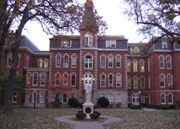
Davenport public schools serve nearly 17,000 students in the communities of Davenport, Blue Grass, Buffalo, and Walcott. The Davenport Community School District is the second largest school district in Iowa.[89] Davenport has three public high schools: Central, West, and North and one private high school: Assumption. There are six public intermediate schools and twenty-three public elementary schools.[90] One of the intermediate schools, Sudlow was named after Phebe Sudlow, the first female public school superintendent in the United States.[91] She was superintendent for Davenport schools from 1874–1878.[91] The high schools are part of the Mississippi Athletic Conference for sports. The city has four colleges and universities: Palmer Chiropractic College, which is the first chiropractic school in the world,[92] Saint Ambrose University, Kaplan University, and Hamilton Technical College. Marycrest International University was a university in Davenport from 1939 to 2002, when it closed and became senior citizen housing.
Infrastructure
Transportation
Three interstate highways serve Davenport: Interstate 80, Interstate 280, and Interstate 74. U.S. Route 6, U.S. Route 61, and U.S. Route 67 also go through Davenport; U.S. 67 crosses over to Illinois via the Rock Island Centennial Bridge. Davenport is connected to the Illinois side of the Quad Cities by a total of three bridges across the Mississippi River. The Government Bridge and the Centennial Bridge connect Downtown Davenport with the Rock Island Arsenal and downtown Rock Island, respectively. The I-280 Bridge connects the western edge of Davenport with the western edge of Rock Island.

Other highways include Iowa Highway 22, which is on the city's southwest side, and Iowa Highway 130, which runs along Northwest Boulevard on Davenport's north edge. For air travel, Davenport Municipal Airport – located adjacent to the city's northern city limits – serves smaller aircraft, and is the home of the annual Quad City Airshow. The Quad City International Airport across the river in Moline, Illinois, is the closest commercial airport. Major railroads include the Iowa Interstate Railroad and the Iowa, Chicago and Eastern. Two national U.S. recreation trails intersect in Davenport: the Mississippi River Trail and the American Discovery Trail.
Amtrak currently does not serve Davenport or the Quad Cities. The closest station is about 50 miles (80 km) away in Galesburg, Illinois. In 2008, the two current United States Senators from Iowa, Tom Harkin and Chuck Grassley, Illinois Senator Dick Durbin, and former Senator Barack Obama sent a letter to Amtrak asking them to begin plans to bring rail service to the Quad Cities.[93] They hope to see passenger rail service up and running in two years from Iowa City to the Quad Cities and from the Quad Cities to Chicago.[93] Greyhound Lines/Burlington Trailways bus service has a station in Davenport. The building is shared with the local Davenport Citibus.[94] Davenport does not have any river ports.
Davenport has an infamous "truck-eating bridge".[95] The bridge, or rather three bridges, is a set of railroad bridges that cross over north and southbound U.S. Route 61 and another street. Evey year an average of twelve semi trucks hit the bridge, usually causing massive damage to the trucks.[95] The bridges, made out of iron, steel, and concrete, are rarely damaged.[95]
Davenport Citibus
Public transit appeared in Davenport in 1969 when the city created a City Transit Authority.[94] The authority at first provided monetary support to Davenport City Lines Bus Company, which was a privately owned company. After a few years the city purchased the Davenport City Lines and placed the operation of public transportation under the jurisdiction of the City's Department of Municipal Transportation. Today, CitiBus is a division of the Department of Public Works. CitiBus has a total of 20 vehicles and covers approximately 30 square miles (78 km2) of the city. CitiBus connects with both Bettendorf Transit and the Illinois Quad Cities mass transit system, MetroLINK.[94] In 2007 Citibus saw a ridership of 1,022,815 customers. Ridership as of September 2008 had grown to 1,045,000 due in part to high gas prices.[96]
Utilities and health care

Electricity to Davenport, and the rest of the Iowa Quad Cities, is provided by MidAmerican Energy Company. Water is provided by the Mississippi River and is treated by the Iowa American Water Company. The water treatment facility is located in southeast Davenport. The contaminants in the water are far below government standards.[97]
Davenport is served by two hospitals: Genesis East and Genesis West part of the Genesis Health System. Together the facilities, along with two other facilities outside Davenport have 665 beds.[98] The hospitals employ more than 600 physicians and 5,000 staff members.[98] The American Nurses Credentialing Center, awarded Genesis Medical Center the Magnet designation for excellence in nursing services.[99] Fewer than three percent of hospitals receive this honor.[99]
Notable natives
Notable Davenporters include jazz musician Bix Beiderbecke,[100] after whom the Bix 7 road race and jazz festival are named. The artist Isabel Bloom was raised in Davenport;[101] she is the creator of decorative concrete figurines that bear her name. Other natives include the aviation pioneer Samuel Cody,[102] actor Stuart Margolin and actress Lara Flynn Boyle.[103] Sports figures born in Davenport include NFL running back Roger Craig[104] and former middleweight boxing champion Michael Nunn.[105]
Livability Award
Davenport (along with neighboring Rock Island, Illinois), won the 2007 City Livability Award in the small-city category from the U.S. Conference of Mayors. Tom Cochran, Executive Director of the Conference, stated that the award "gives the Conference a chance to highlight mayoral leadership in making urban areas safer, cleaner and more livable."[106] The award acknowledges achievements from the RiverVision plan of Davenport and Rock Island; "RiverVision is a bi-state collaboration between Davenport and Rock Island to transform the Mississippi River’s edge into one of the most compelling waterfronts in the nation."[107]
See also
- Bucktown, Davenport
- African Americans in Davenport, Iowa
Notes
- ↑ Gluba is a Democrat but city elections are nonpartisan
- ↑ 2.0 2.1 2.2 "Davenport History: Pre-Settlement and Early Years". Davenport Public Library. http://www.qcmemory.org/Default.aspx?PageId=223&nt=207&nt2=222. Retrieved 2007-12-18.
- ↑ 3.0 3.1 3.2 Svendsen, Davenport A Pictorial History p. 19
- ↑ 4.0 4.1 "Davenport History: Early Collisions with the First Bridge". Davenport Public Library. http://www.qcmemory.org/Default.aspx?PageId=414&nt=207&nt2=229. Retrieved 2007-12-18.
- ↑ Pfeiffer, David A.. "Bridging the Mississippi: The Railroads and Steamboats Clash at the Rock Island Bridge". National Archives and Records Administration. http://www.archives.gov/publications/prologue/2004/summer/bridge.html. Retrieved 2008-09-29.
- ↑ Svendsen, Davenport A Pictorial History p. 12
- ↑ 7.0 7.1 Svendsen, Davenport A Pictorial History p. 54
- ↑ Consumer Price Index (estimate) 1800–2008. Federal Reserve Bank of Minneapolis. Retrieved December 7, 2010.
- ↑ Svendsen, Davenport A Pictorial History p. 88
- ↑ 10.0 10.1 10.2 10.3 10.4 Brecht, Tony. "Davenport thinks cycle on upswing again". Dispatch - Argus. http://qconline.com/progress99/1pgdport.shtml. Retrieved 2008-01-07.
- ↑ "US Gazetteer files: 2000 and 1990". United States Census Bureau. 2005-05-03. http://www.census.gov/geo/www/gazetteer/gazette.html. Retrieved 2008-01-31.
- ↑ "Iowa – Place". United States Census Bureau. http://factfinder.census.gov/servlet/GCTTable?_bm=y&-context=gct&-ds_name=DEC_2000_SF1_U&-mt_name=DEC_2000_SF1_U_GCTPH1_ST7&-CONTEXT=gct&-tree_id=4001&-geo_id=04000US19&-format=ST-7. Retrieved 2008-11-09.
- ↑ "QRivers of Life: Mississippi River Information". Hamline University. http://cgee.hamline.edu/rivers/Resources/river_days/info.html. Retrieved 2009-12-08.
- ↑ 14.0 14.1 Geyer, Thomas (2003-06-28). "Floodwall not in near future for Davenport". Quad-City Times. http://www.qctimes.com/news/local/article_c099bb28-7bb2-5ac3-a069-2460f7fbeb8d.html. Retrieved 2007-12-19.
- ↑ Fountain, John W. (2001-04-27). "Flooded City Awaits Word on U.S. Help". New York Times. http://www.nytimes.com/2001/04/27/national/27FLOO.html?ex=1225684800&en=68b4bd5d5a3aa248&ei=5070. Retrieved 2008-11-01.
- ↑ Ickes, Barb (2001-08-02). "Good thing it doesn't take a city to raise a museum". Quad-City Times. http://www.qctimes.com/sports/basketball/college/big-10/iowa/article_2a00c222-d996-5f3e-b33d-1625aac85c4d.html. Retrieved 2009-03-25.
- ↑ "Snowfall average". National Oceanic and Atmospheric Administration. http://lwf.ncdc.noaa.gov/oa/climate/online/ccd/snowfall.html. Retrieved 2008-01-29.
- ↑ 18.0 18.1 "Monthly Averages for Davenport, IA". Weather Channel. http://www.weather.com/outlook/health/allergies/wxclimatology/monthly/52804. Retrieved 2007-08-24.
- ↑ "July Daily Averages for Davenport, IA". Weather Channel. http://www.weather.com/outlook/health/allergies/wxclimatology/daily/52804?climoMonth=7. Retrieved 2008-01-29.
- ↑ "February Daily Averages for Davenport, IA". Weather Channel. http://www.weather.com/outlook/health/allergies/wxclimatology/daily/52804?climoMonth=2. Retrieved 2008-01-29.
- ↑ "Climate of Moline, Illinois". National Oceanic and Atmospheric Administration. http://www.crh.noaa.gov/images/dvn/downloads/Climate%20of%20Moline.pdf. Retrieved 2008-11-05.
- ↑ 22.0 22.1 Wundram, Bill (2007-06-02). "Did Mass Mound save Davenport again?". Quad-City Times. http://www.qctimes.com/news/opinion/editorial/columnists/bill-wundram/article_0d7b0e79-a91f-5806-8b0c-f7c322f42198.html. Retrieved 2007-12-19.
- ↑ "Davenport History". Davenport Public Library. http://www.qcmemory.org/Default.aspx?PageId=228&nt=207&nt2=222. Retrieved 2007-12-18.
- ↑ Brecht, Tory (2008-10-03). "Credit Island to reopen Saturday". Quad-City Times. http://www.qctimes.com/news/local/article_c362665a-0922-51d4-8c85-944700e631e5.html. Retrieved 2008-10-05.
- ↑ "Flood Facts". Davenport Public Library. http://www.qcmemory.org/Page/Flood_Facts.aspx?nt=266. Retrieved 2009-04-16.
- ↑ "Duck Creek Flooding Closes Davenport Streets". Dispatch - Argus. http://www.qconline.com/archives/qco/display.php?id=391015. Retrieved 2009-04-17.
- ↑ 27.0 27.1 Historic Preservation in Davenport, Iowa, p. 17
- ↑ Historic Preservation in Davenport, Iowa, p. 12
- ↑ Historic Preservation in Davenport, Iowa, p. 31
- ↑ Historic Preservation in Davenport, Iowa, p. 36
- ↑ Historic Preservation in Davenport, Iowa, p. 19
- ↑ 32.0 32.1 Historic Preservation in Davenport, Iowa, p. 35
- ↑ 33.0 33.1 Heitz, David (2007-03-15). "Ask the Times: Davenport buildings tower above the rest". Quad-City Times. http://www.qctimes.com/news/local/article_7e5a04ad-8a54-5fb3-8f02-d2fd3af7a3b8.html. Retrieved 2008-10-05.
- ↑ 34.0 34.1 "Population Estimates and Rankings for Population, Numerical Change, and Percent Change for Iowa's Incorporated Places: 2000–2008" (PDF). United States Census Bureau. http://factfinder.census.gov/servlet/SAFFPopulation?_event=Search&_name=davenport&_state=04000US19&_county=davenport&_cityTown=davenport&_zip=&_sse=on&_lang=en&pctxt=fph. Retrieved 2009-07-01.
- ↑ "Population Estimates". United States Census Bureau. http://factfinder.census.gov/servlet/SAFFPopulation?_event=Search&_name=scott+county&_state=04000US19&_county=scott+county&_cityTown=scott+county&_zip=&_sse=on&_lang=en&pctxt=fph. Retrieved 2010-06-29.
- ↑ "Illinois by County". United States Census Bureau. http://factfinder.census.gov/servlet/GCTTable?_bm=y&-context=gct&-ds_name=PEP_2009_EST&-_box_head_nbr=GCT-T1-R&-CONTEXT=gct&-mt_name=PEP_2009_EST_GCTT1R_ST9S&-tree_id=808&-redoLog=false&-geo_id=04000US17&-_sse=on&-format=ST-2S&-_lang=en. Retrieved 2010-06-29.
- ↑ 37.0 37.1 "United States -- States; and Puerto Rico". United States Census Bureau. http://factfinder.census.gov/servlet/GCTTable?_bm=y&-geo_id=&-ds_name=DEC_2000_SF1_U&-_lang=en&-_caller=geoselect&-redoLog=false&-format=US-9. Retrieved 2010-06-29.
- ↑ 38.0 38.1 "Iowa -- Place". United States Census Bureau. http://factfinder.census.gov/servlet/GCTTable?_bm=y&-geo_id=04000US19&-_box_head_nbr=GCT-PH1&-ds_name=DEC_2000_SF1_U&-redoLog=true&-format=ST-7. Retrieved 2010-06-29.
- ↑ 39.0 39.1 39.2 "American FactFinder". United States Census Bureau. http://factfinder.census.gov. Retrieved 2008-01-31.
- ↑ "Iowa Fact Sheet". United States Census Bureau. http://factfinder.census.gov/servlet/ACSSAFFFacts?_event=&geo_id=04000US19&_geoContext=01000US. Retrieved 2010-06-29.
- ↑ 41.0 41.1 "Davenport Fact Sheet". United States Census Bureau. http://factfinder.census.gov/servlet/ACSSAFFFacts?_event=&geo_id=16000US1919000&_geoContext=01000US. Retrieved 2010-06-29.
- ↑ 42.0 42.1 42.2 "2006 Annual Report" (PDF). Davenport Police Department. http://www.cityofdavenportiowa.com/egov/docs/1189798514_907684.pdf. Retrieved 2009-08-24.
- ↑ "Davenport, IA". United States Census Bureau. http://factfinder.census.gov/servlet/SAFFEconFacts?_event=&geo_id=16000US1919000&_geoContext=01000US%7C04000US19%7C16000US1919000&_street=&_county=davenport&_cityTown=davenport&_state=04000US19&_zip=&_lang=en&_sse=on&ActiveGeoDiv=&_useEV=&pctxt=fph&pgsl=160&_submenuId=business_1&ds_name=&_ci_nbr=&qr_name=®=&_keyword=&_industry=. Retrieved 2008-02-26.
- ↑ 44.0 44.1 "The Answer Book 2011". Quad City Times. p. 20.
- ↑ "About Us". Von Maur. http://www.vonmaur.com/Default.aspx?PageId=2&nt=9. Retrieved 2008-03-10.
- ↑ "Von Maur's strategy of steady growth pays off during downturn". Quad-City Times. 2008-11-10. http://www.qctimes.com/business/article_6e85102d-4dee-51a0-9ecf-5b0dbe5fd6d9.html. Retrieved 2009-12-04.
- ↑ "Lee newspaper legacy reaches back to 1890". Lee Enterprises. http://www.lee.net/aboutlee/history/. Retrieved 2008-03-10.
- ↑ "Davenport-Moline-Rock Island, IA-IL". United States Department of Labor. http://stats.bls.gov/eag/eag.ia_davenport_msa.htm. Retrieved 2009-11-18.
- ↑ 49.0 49.1 "Davenport, Iowa Income". United States Census Bureau. http://factfinder.census.gov/servlet/STTable?_bm=y&-geo_id=16000US1919000&-qr_name=ACS_2006_EST_G00_S1901&-ds_name=ACS_2006_EST_G00_. Retrieved 2008-02-26.
- ↑ "Metro home prices flat". Cable News Network (CNN). 2006-08-15. http://money.cnn.com/2006/08/15/real_estate/metro_prices_table/index.htm. Retrieved 2008-03-06.
- ↑ "Best Places For Business And Careers". Forbes. http://www.forbes.com/lists/2010/1/business-places-10_Davenport-IA_2881.html. Retrieved 2010-06-30.
- ↑ "Best Places For Business And Careers". Forbes. http://www.forbes.com/lists/2009/1/bizplaces09_Davenport-IA_2881.html. Retrieved 2009-08-24.
- ↑ "Where homes are affordable". Cable News Network (CNN). http://money.cnn.com/galleries/2009/moneymag/0906/gallery.bplive_affhomes.moneymag/16.html. Retrieved 2009-11-18.
- ↑ Arnold, Rebecca (2007-07-14). "From D-Day to RIA, historic First Army brings clout to QC". Quad-City Times. http://www.qctimes.com/news/local/rock-island/article_558c7a93-2129-581c-8767-4354eefa5ac5.html. Retrieved 2009-03-25.
- ↑ "Centro to close Dec. 31; new restaurant will open in January". Quad City Times. 2007-11-08. http://qctimes.com/business/article_3e07e8e4-9fac-5db7-a180-a7612e884186.html. Retrieved 2010-07-06.
- ↑ Gaul, Alma (2007-04-27). "Putnam retires IMAX debt, prepares to launch endowment campaign". Quad-City Times. http://www.qctimes.com/news/local/article_b179c6b0-98f5-5bcf-b45c-4ef63f043e3b.html. Retrieved 2009-03-25.
- ↑ "Orchestra Roster". Quad City Symphony Orchestra. http://www.qcsymphony.com/mus_orchestra.cfm. Retrieved 2008-07-08.
- ↑ Svendsen, Davenport A Pictorial History p. 82
- ↑ 59.0 59.1 Doxsie, Don (1994-07-31). "Q-C race has grown from a humble beginning into one of the nation's most spectacular events". Quad-City Times. http://www.qctimes.com/sports/running/bix7/article_59ed56e0-06cf-5e3d-9f7d-931fb4fd9127.html. Retrieved 2009-09-22.
- ↑ Moeller, Sean (2007-06-26). "Q-C area entries lagging Of the 10,000 signed up, 1/3 are from the area". Quad-City Times. http://www.qctimes.com/sports/running/bix7/article_4260b52b-7468-5a5c-bc49-cd54ab237f1a.html. Retrieved 2008-11-10.
- ↑ Doxsie, Don (2008-07-27). "Viewpoint: Quality of Bix 7 isn't measured in size". Quad-City Times. http://www.qctimes.com/sports/running/bix7/article_0cd79c67-d52c-5a2c-b588-07e0a591d56e.html. Retrieved 2008-11-10.
- ↑ Speer, Mary Louise (2009-08-09). "260,000 visit this year's Mississippi Valley Fair". Quad-City Times. http://www.qctimes.com/news/local/article_d8303774-8559-11de-b555-001cc4c03286.html. Retrieved 2009-08-12.
- ↑ Fudge, Tamara (2009-07-20). "Thousands ride into Sturgis Mississippi River Motorcycle Rally". Quad-City Times. http://www.qctimes.com/news/local/article_eb6f94ec-5e03-11de-a1e5-001cc4c002e0.html. Retrieved 2009-08-12.
- ↑ 64.0 64.1 64.2 64.3 "Who are our Sister Cities?". City of Davenport. http://www.cityofdavenportiowa.com/department/board.asp?fDD=5-33. Retrieved 2008-03-17.
- ↑ "City of Davenport". City of Davenport. http://www.cityofdavenportiowa.com/department/index.asp?fDD=21-0. Retrieved 2008-01-07.
- ↑ 66.0 66.1 66.2 66.3 "City of Davenport". City of Davenport. http://www.cityofdavenportiowa.com/department/division.asp?fDD=21-194. Retrieved 2008-03-07.
- ↑ Geyer, Thomas. "Q-C Packed with People". Quad-City Times. http://www.qctimes.com/news/local/article_ad7cc9be-d01e-5573-988f-7dd1295ff0b7.html. Retrieved 2009-11-19.
- ↑ "Riverfront trail forum is tonight". Quad-City Times. 2007-08-23. http://www.qctimes.com/news/article_6b929276-6bae-5f49-92f8-73bb97fef702.html. Retrieved 2008-03-07.
- ↑ "City of Davenport". City of Davenport. http://www.cityofdavenportiowa.com/department/index.asp?fDD=41-0. Retrieved 2008-03-07.
- ↑ Sightseeing Cruise. Celebration River Cruises. Retrieved 2009-08-22.
- ↑ Day Long Cruises. Celebration River Cruises. Retrieved 2009-08-22.
- ↑ Channel Cat Water Taxi – Routes MetroLink. Retrieved 2009-08-22.
- ↑ Gorman, Bill. "Nielsen Local Television Market Universe Estimates". TV By the Numbers. http://tvbythenumbers.com/2008/09/10/nielsen-local-television-market-universe-estimates/5037. Retrieved 2009-11-18.
- ↑ "Arbitron Radio Market Rankings: Fall 2007". Arbitron. http://www.arbitron.com/radio_stations/mm001050.asp. Retrieved 2009-11-18.
- ↑ 75.0 75.1 "Davenport History 2". Davenport Public Library. http://www.qcmemory.org/Default.aspx?PageId=227&nt=207&nt2=222. Retrieved 2007-12-18.
- ↑ "About the Mayor". City of Davenport. http://www.cityofdavenportiowa.com/department/division.asp?fDD=5-31. Retrieved 2008-01-18.
- ↑ "The Role of the City Council". City of Davenport. http://www.cityofdavenportiowa.com/egov/docs/1153276696566.htm. Retrieved 2008-01-18.
- ↑ "2011 City-Wide Goals". City of Davenport. http://www.cityofdavenportiowa.com/egov/docs/1179334425605.htm. Retrieved 2008-02-05.
- ↑ 79.0 79.1 79.2 79.3 79.4 79.5 79.6 79.7 Svendsen, Davenport historical survey report : a thematic history of Davenport, Iowa, 1836-1940 with reference to buildings, structures & sites p. 7-1
- ↑ 80.0 80.1 Svendsen, Davenport historical survey report : a thematic history of Davenport, Iowa, 1836-1940 with reference to buildings, structures & sites p. 7-2
- ↑ 81.0 81.1 81.2 81.3 "2008 Budget" (PDF). City of Davenport. https://www.cityofdavenportiowa.com/egov/docs/629151190297592.pdf. Retrieved 2008-02-05.
- ↑ 82.0 82.1 82.2 "2008 Department Budget" (PDF). City of Davenport. https://www.cityofdavenportiowa.com/egov/docs/776641190297782.pdf. Retrieved 2008-02-05.
- ↑ "Iowa Senate District 41". Iowa General Assembly. http://www.legis.state.ia.us/Redist/sjpg/s-41.jpg. Retrieved 2009-09-19.
- ↑ "Iowa Senate District 42". Iowa General Assembly. http://www.legis.state.ia.us/Redist/sjpg/s-42.jpg. Retrieved 2009-09-19.
- ↑ "Iowa Senate District 43". Iowa General Assembly. http://www.legis.state.ia.us/Redist/sjpg/s-43.jpg. Retrieved 2009-09-19.
- ↑ "Iowa House of Representatives district 81". Iowa General Assembly. http://www.legis.state.ia.us/Redist/hjpg/h-81.jpg. Retrieved 2009-09-19.
- ↑ "Iowa House of Representatives district 85". Iowa General Assembly. http://www.legis.state.ia.us/Redist/hjpg/h-85.jpg. Retrieved 2009-09-19.
- ↑ "Iowa House of Representatives district 86". Iowa General Assembly. http://www.legis.state.ia.us/Redist/hjpg/h-86.jpg. Retrieved 2009-09-19.
- ↑ "Schools". Davenport Community Schools. http://www.davenportschools.org/schools.asp. Retrieved 2007-12-18.
- ↑ City of Davenport, Iowa. "Directory of Schools". Davenport Community Schools. http://www.davenportschools.org/schools/schooldirectory.asp. Retrieved 2009-12-08.
- ↑ 91.0 91.1 "Phebe W. Sudlow: Iowa’s First Lady of Education". Davenport Public Library. http://www.qcmemory.org/Default.aspx?PageId=238&nt=207&nt2=229. Retrieved 2009-09-24.
- ↑ Dooley, Sheena (2006-09-20). "Celebrating Palmer's past". Quad-City Times. http://www.qctimes.com/news/local/article_e99a9e53-bbd4-594e-8761-06728e5995b3.html. Retrieved 2009-03-25.
- ↑ 93.0 93.1 Coulter, Melissa (2008-06-06). "Ready to trade wheels for rails". Quad-City Times. http://www.qctimes.com/news/opinion/editorial/columnists/alma-gaul/article_7311518b-a2e5-58d5-b82e-4de48362f0c2.html. Retrieved 2008-09-29.
- ↑ 94.0 94.1 94.2 "About Davenport CitiBus". City of Davenport. http://www.cityofdavenportiowa.com/department/division.asp?fDD=27-138. Retrieved 2008-09-29.
- ↑ 95.0 95.1 95.2 Wundram, Bill (2008-04-20). "'Troll' tracks toll of truck-eating bridge". Quad-City Times. http://www.qctimes.com/news/opinion/editorial/columnists/bill-wundram/article_76f01e1c-fe68-56e8-ab08-5505c9cce33e.html. Retrieved 2009-10-12.
- ↑ "Ridership for CitiBus grows". Quad-City Times. 2008-09-11. http://www.qctimes.com/news/local/article_a9f839d0-302b-5778-ad6d-c5a970a7314f.html. Retrieved 2008-09-30.
- ↑ "2006 Water Quality Report" (PDF). American Water. http://www.amwater.com/files/IA-QuadCities.pdf. Retrieved 2008-01-25.
- ↑ 98.0 98.1 "Welcome To Genesis Medical Center". Genesis Health System. http://www.genesishealth.com/about/index.aspx. Retrieved 2008-01-25.
- ↑ 99.0 99.1 Treiber, Rachelle (2005-10-05). "Genesis wins care award". Quad-City Times. http://www.qctimes.com/business/article_19335c77-e541-50a7-83c3-0db9c8120411.html. Retrieved 2008-11-18.
- ↑ "Bix Beiderbecke". Davenport Public Library. http://www.qcmemory.org/Default.aspx?PageId=233&nt=207&nt2=229. Retrieved 2008-01-18.
- ↑ "Isabel Bloom Remembered". Isabel Bloom, L.L.C. http://www.ibloom.com/Default.aspx?PageId=109&nt=104. Retrieved 2008-01-18.
- ↑ Reese, Peter (2006). The Flying Cowboy: Samuel Cody, Britain's first airman. Stroud, Gloucestershire: Tempus. p. 15. ISBN 0752436597. http://books.google.com/books?q=samuel+cody+davenport%2C+iowa&btnG=Search+Books. Retrieved 2009-12-12.
- ↑ "Lara Flynn Boyle". IGN Entertainment. http://www.askmen.com/celebs/women/actress_100/128_lara_flynn_boyle.html. Retrieved 2008-12-03.
- ↑ "NFL Roger Craig". National Football League (NFL). http://www.nfl.com/players/rogercraig/profile?id=CRA303870. Retrieved 2008-01-18.
- ↑ Ruger, Todd (2004-12-26). "Michael nunn; Ex-boxer sentenced". Quad-City Times. http://www.qctimes.com/news/local/article_d1c195a2-9296-5006-97e0-f53bf4a97324.html. Retrieved 2008-11-01.
- ↑ "2007 City Livability Award Winnders Announced" (PDF). The United States Conferences of Mayors. http://www.usmayors.org/75thAnnualMeeting/citylivability/pressrelease_062507.pdf. Retrieved 2008-01-19.
- ↑ Brecht, Tory (2007-08-09). "Livability award comes to the Q-C". Quad-City Times. http://www.qctimes.com/news/local/article_6793b126-3de0-558a-82aa-e6ef34fe9a89.html. Retrieved 2008-11-24.
References
- Plan and Zoning Commission, Historic preservation in Davenport, Iowa for inclusion in the Davenport Comprehensive Plan, Davenport (1985) OCLC 20501198
- Svendsen, Marlys, Davenport A Pictorial History, (1987) Davenport: G. Bradley Publishing, Inc., ISBN 0940286-05-x
- Svendsen, Marlys, Davenport historical survey report : a thematic history of Davenport, Iowa, 1836-1940 with reference to buildings, structures & sites, (1980) Davenport, OCLC 21526770
External links
- City of Davenport
- DavenportIowa.us – Local Information
- QCOnline.com – Local information
- QCTimes.com – Local Newspaper
- Visit Quad Cities – Visitor Information
|
||||||||||||||||||||
|
|||||||||||||||||
|
|||||||||||||||||
|
||||||||||||||||||||

